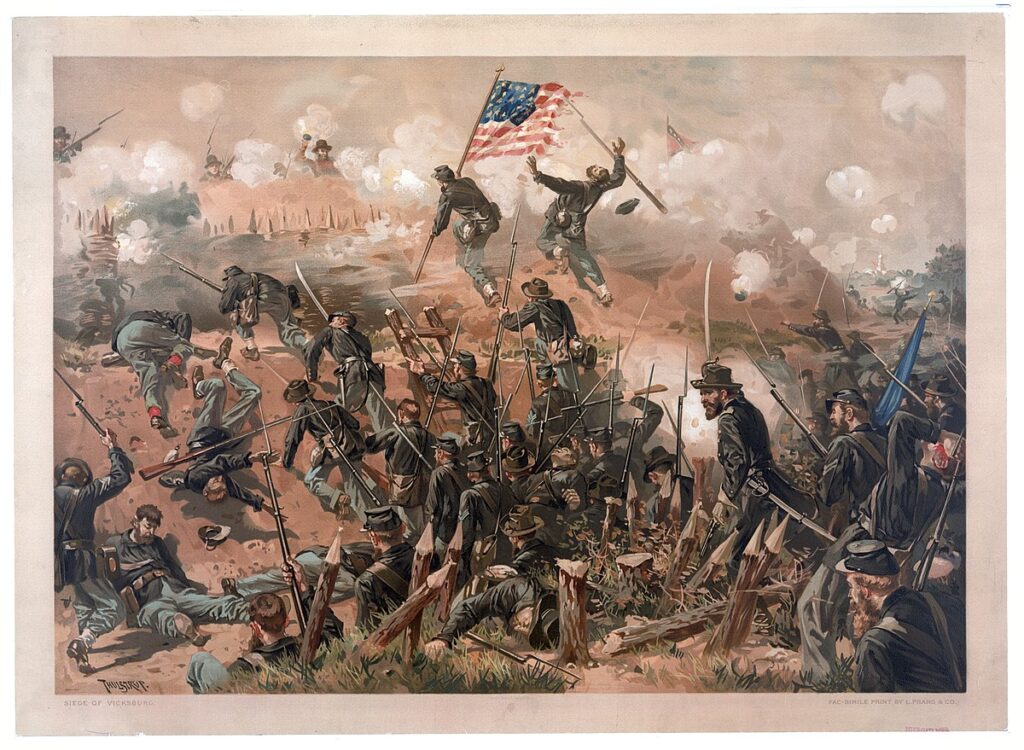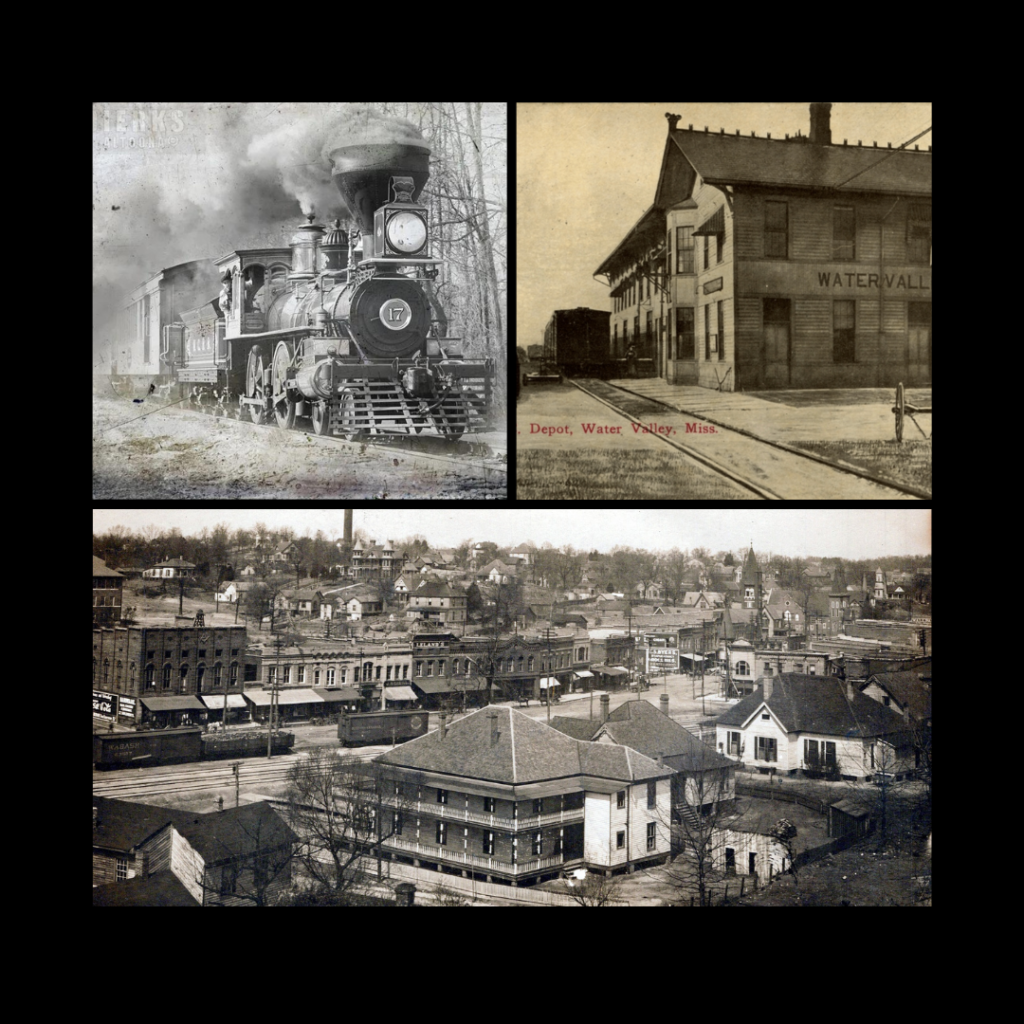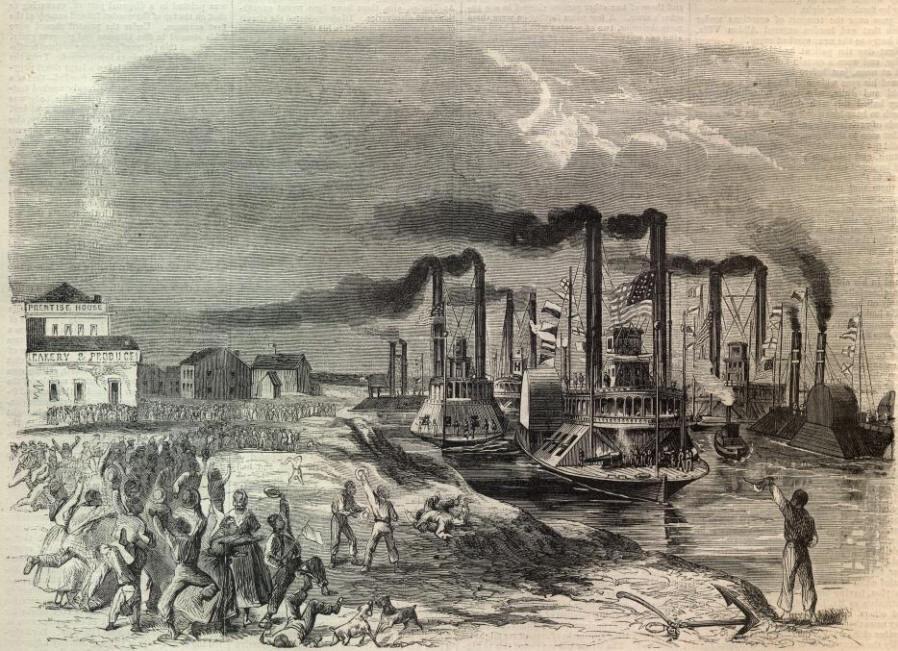Prentiss wrote to his brother George about his riverport town “‘..Vicksburg, in 1836-7, was a remarkable place. Like so many flourishing towns along the great lakes and rivers of the West, it had sprung into existence as if by magic. The city was younger than half the children who played about its streets. As a shipping point for a rich and rapidly growing cotton region, its business was very large. Capital and population flowed in from every quest.
“’Magnificent steamers, freighted with the products of our own and distant climes, were perpetually stopping on their way to and from New Orleans, Nashville, St. Louis, Cincinnati or Louisville; and rarely did an up-river boat arrive without landing one or more passengers in pursuit of fortune. Vicksburg was, in fact, a sort of rendezvous for planters, lawyers, physicians, schoolmasters, mechanics, clerks, and merchants, who in search of business, were emigrating to the Southwest from New England, Virginia, North and South Carolina, Kentucky, Tennessee, and other parts of the Union.'” “Prentiss Hits Vicksburg Jackpot.” The Franklin Sun, 11 Aug. 2021.
At this point, it might seem that my purpose in sharing this story is to tell about how Vicksburg, MS, came into being and managed to thrive after the Civil War, but my true intention is larger than that. On September 17, 2023, I attended a meeting of my local historical society, and I learned about an entrepreneur by the name of Thomas Cherry McMackin.
I learned that McMackin had originally moved to a wilderness area near Water Valley, MS, in Yalobusha County, but he left there to become a successful hotel and restaurant man in other locations, including that of Pontotoc, MS, and Vicksburg, MS.
“From the 1830s through the Post Civil War days, Mississippi boasted one of the best-known innkeepers in the young United States. Thomas Cherry McMackin, born about 1800, came to Mississippi like so many others of his day from South Carolina. Beginning around 1834, he operated a shack of a tavern in the wilderness of what is today Yalobusha County. A year later, he relocated to Pontotoc….McMackin went to work serving the public of Pontotoc even before he had a building, on one occasion feeding some 1100 persons in the open air with ‘an abundance of delicacies, and a plentiful supply of champagne,’ though ‘the sparkling beverage [had to be consumed] from tin cups!’ Davy Crockett may well have been in that crowd – he sold horses in Pontotoc for a few months that year before leaving for his Alamo fate. So esteemed was McMackin as a landlord that his clientele dubbed him General.
“The General built in Pontotoc ‘an immense establishment, including comfortable hewed-log white-washed cabins, with brick chimneys, around a great square’ for sleeping quarters for 300 men and ‘a vast dining room and tables, [in]which for months’ would be fed 700 to 1000 persons per day. He printed no bill of fare; rather, he shouted out his menu, always working in his signature phrase ‘with or without onions.’ When asked why [he] did not list his offerings in writing, he would explain that many of his customers were members of the state legislature and could not read.
“The General sold his Pontotoc place and moved on to serve taverns, inns, and hotels in Memphis and Jackson, Mississippi, before settling in Vicksburg. A correspondent for the Nashville Union wrote of seeing McMackin presiding at the Prentiss House in the latter city in 1871. Despite the hostilities of Reconstruction, Confederate veterans, Blue-coated soldiers, carpetbaggers and scalawags sat and dined together. The General’s voice could be heard loud and clear above the din of steel and crockery, the popping of bottles and clatter of glasses. ‘Oyster soup, soup without oysters and oysters without soup; fried fish, boiled fish, Mississippi trout, fish from the rivers and fish from the sea; roast beef, boiled beef, toast mutton, boiled mutton, mutton with caper sauce; beef and mutton, with and without onions. . . potatoes baked and potatoes fried upon one side, and potatoes fried upon the other side, with celery, peas, cabbage, turnips and vegetables and sauces of all sorts. Gentlemen and ladies, help yourselves. I hope you are well supplied. Oh it does my soul good to see you happy! Waiters, hurry up the dessert. Cranberry tarts, apple pie and pies of all kinds, plum pudding, and cold potato pudding….Fruits and nuts from all countries, and wines from all countries, and wines from Italy, Germany and France; wines from the Rhine and wines… from Portugal, and wines from Ohio. Gentleman and ladies, we are an immense people, in spite of war.'” James T. McCafferty “Mississippi’s ‘Unrivaled’ Innkeeper of Old.” Mississippi Matters, 23 Oct. 2017, www.mississippimatters.info/single-post/2017/08/08/miss-unrivaled-innkeeper-of-the-1800s.
As is often the case when I am telling a story, I felt the need to tell you about Yalobusha County, the men who built Vicksburg, and the Battle thereof to get to my punchline. Now, that we have begun to discover who Thomas Cherry McMackin was and the fact that he was a leading restauranter at the Prentiss House in Vicksburg, I found myself wanting to know more about that place, too.
I discovered that the Prentiss House was built by Sergeant Prentiss, who we have discussed previously.
 I am researching a couple of stories that seem to link Water Valley, MS, in Yalobusha County, and Vicksburg, a town east of Water Valley and on the Mississippi River, several miles southward. I have discovered that the railroad that ran through Water Valley was a prime target for the federal troops, as they marched toward Vicksburg.
I am researching a couple of stories that seem to link Water Valley, MS, in Yalobusha County, and Vicksburg, a town east of Water Valley and on the Mississippi River, several miles southward. I have discovered that the railroad that ran through Water Valley was a prime target for the federal troops, as they marched toward Vicksburg.
